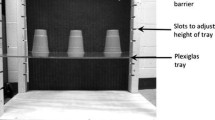Abstract
Metacognitive processes during memory retrieval can be tested by examining whether or not animals can assess their knowledge state when they are faced with a memory test. In a typical foraging task, food is hidden in one of the multiple tubes and the subjects are given an opportunity to check the contents of the tubes before choosing the one that they thought contained food. Following the findings from our previous study that western scrub-jays (Aphelocoma californica) can make prospective metacognition judgements, this study tested the scrub-jays’ concurrent metacognition judgements. In a series of experiments, uncertainty about the food location was induced in three ways: by making the baiting process visibly unavailable, by inserting a delay between the baiting and food retrieval, and by moving the location of the bait. The jays looked into the tubes more often during the conditions that were consistent with high uncertainty. In addition, their looking behaviour was associated not with the sight of food but with information about the location of the food. These findings suggest that the jays can differentiate the states of knowing and not knowing about certain information and take appropriate action to complement their missing knowledge.





Similar content being viewed by others
References
Basile BM, Schroeder GR, Brown EK, Templer VL, Hampton RR (2015) Evaluation of seven hypotheses for metamemory performance in rhesus monkeys. J Exp Psychol Gen 144(1):85–102
Bednekoff PA, Balda RP, Kamil AC, Hile AG (1997) Long-term spatial memory in four seed-caching corvid species. Anim Behav 53:335–341
Beran MJ, Smith JD (2011) Information seeking by rhesus monkeys (Macaca mulatta) and capuchin monkeys (Cebus apella). Cognition 120:90–105
Beran MJ, Smith JD, Perdue BM (2013) Language-trained chimpanzees (Pan troglodytes) name what they have seen, but look first at what they have not seen. Psychol Sci 24(5):660–666
Bräuer J, Call J, Tomasello M (2004) Visual perspective taking in dogs (Canis familiaris) in the presence of barriers. Appl Anim Behav Sci 88:299–317
Call J (2010) Do apes know that they could be wrong? Anim Cogn 13:689–700
Call J, Carpenter M (2001) Do apes and children know what they have seen? Anim Cogn 3:207–220
Carruthers P (2008) Meta-cognition in animals: a skeptical look. Mind Lang 23(1):58–89
Clayton NS, Dickinson A (1998) Episodic-like memory during cache recovery by scrub jays. Nature 395:272–274
Crystal JD, Foote AL (2011) Evaluating information-seeking approaches to metacognition. Curr Zool 57(4):531–542
Dally JM, Emery NJ, Clayton NS (2006) Food-caching western scrub-jays keep track of who was watching when. Science 312:5780
Fujita K (2009) Metamemory in tufted capuchin monkeys (Cebus apella). Anim Cogn 12:169–180
Gordon RM (1995) Folk psychology as simulation. In: Davies M, Stone T (eds) Folk psychology. Blackwell, Oxford, pp 60–73
Goto K, Watanabe S (2012) Large-billed crows (Corvus macrorhynchos) have retrospective but not prospective metamemory. Anim Cogn 15:27–35
Grodzinski U, Watanabe A, Clayton NS (2012) Peep to pilfer: what scrub-jays like to watch when observing others. Anim Behav 83:1253–1260
Hampton RR (2001) Rhesus monkeys know when they remember. Proc Natl Acad Sci USA 98:5359–5362
Hampton RR, Zivin A, Murray EA (2004) Rhesus monkeys (Macaca mulatta) discriminate between knowing and not knowing and collect information as needed before acting. Anim Cogn 7:239–246
Kornell N, Son LK, Terrace HS (2007) Transfer of metacognitive skills and hint seeking in monkeys. Psychol Sci 18:64–71
Le Pelley ME (2012) Metacognitive monkeys or associative animals? Simple reinforcement learning explains uncertainty in nonhuman animals. J Exp Psychol Learn Mem Cogn 38(3):686–708
Marsh HL (2014) Metacognitive-like information seeking in lion-tailed macaques: a generalized search response after all? Anim Cogn 17(6):1313–1328
Morgan G, Kornell N, Kornblum T, Terrace HS (2014) Retrospective and prospective metacognitive judgements in rhesus macaques (Macaca mulatta). Anim Cogn 17:249–257
Nakamura N, Watanabe S, Betsuyaku T, Fujita K (2011) Do birds (pigeons and bantams) know how confident they are of their perceptual decisions? Anim Cogn 14:83–93
Nakao H, Goto K (2015) Methodological problems in animal metacognition research. Jpn J Anim Psychol. doi:10.2502/janip.65.1.1
Neldner K, Collier-Baker E, Nielsen M (2015) Chimpanzees (Pan troglodytes) and human children (Homo sapiens) know when they are ignorant about the location of food. Anim Cogn 18(3):683–699
Nelson TO, Narens L (1990) Metamemory: A theoretical framework and some new findings. In: Bower GH (ed) The psychology of learning and motivation. Academic Press, New York, pp 125–173
Raby CR, Alexis DM, Dickinson A, Clayton NS (2007) Planning for the future by western scrub-jays. Nature 445:919–921
Roberts WA, Feeney MC, McMillan N, MacPherson K, Musolino E, Petter M (2009) Do pigeons (Columba livia) study for a test? J Exp Psychol Anim Behav Process 35:129–142
Shields WE, Smith JD, Guttmannova K, Washburn DA (2005) Confidence judgments by humans and rhesus monkeys. J Gen Psychol 132(2):165–186
Smith JD, Shields WE, Washburn DA (1998) Memory monitoring by animals and humans. J Exp Psychol Gen 127(3):227–250
Smith JD, Shields WE, Washburn DA (2003) The comparative psychology of uncertainty monitoring and metacognition. Behav Brain Sci 26:317–373
Smith JD, Beran MJ, Couchman JJ, Coutinho MVC (2008) The comparative study of metacognition: sharper paradigms, safer inferences. Psychon Bull Rev 15(4):679–691
Suda-King C (2008) Do orangutans (Pongo pygmaeus) know when they do not remember? Anim Cogn 11(1):21–42
Tulving E, Madigan SA (1970) Memory and verbal learning. Annu Rev Psychol 21:437–484
Vining AQ, Marsh HL (2015) Information seeking in capuchins (Cebus apella): a rudimentary form of metacognition? Anim Cogn 18(3):667–681
Watanabe S, Clayton NS (2007) Observational visuospatial encoding of the cache locations of others by western scrub-jays (Aphelocoma californica). J Ethol 25(3):271–279
Watanabe A, Grodzinski U, Clayton NS (2014) Western scrub-jays allocate longer observation time to more valuable information. Anim Cogn 17:859–867
Acknowledgments
We thank Paul Heavens, Charmaine Donovan, and the staff of the Madingley Sub-department of Animal Behaviour for care of the birds, Rosie Bryce for her help with video analyses, and the two anonymous reviewers for their valuable comments on the manuscript. This study formed part of A.W.’s Ph.D., which was supported by an ORS award and the Cambridge Overseas Trust, and we thank the examiners, Lisa Saksida and Selvino de Kort, for their insightful advices. The research was funded by a grant from BBSRC, and maintenance of the birds by the University of Cambridge.
Author information
Authors and Affiliations
Corresponding author
Rights and permissions
About this article
Cite this article
Watanabe, A., Clayton, N.S. Hint-seeking behaviour of western scrub-jays in a metacognition task. Anim Cogn 19, 53–64 (2016). https://doi.org/10.1007/s10071-015-0912-y
Received:
Revised:
Accepted:
Published:
Issue Date:
DOI: https://doi.org/10.1007/s10071-015-0912-y




